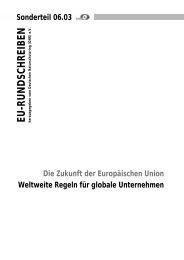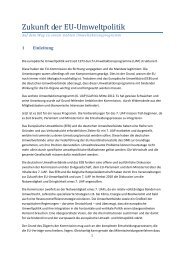Nachhaltiges Europa Abschlusspublikation - Global Marshall Plan
Nachhaltiges Europa Abschlusspublikation - Global Marshall Plan
Nachhaltiges Europa Abschlusspublikation - Global Marshall Plan
Erfolgreiche ePaper selbst erstellen
Machen Sie aus Ihren PDF Publikationen ein blätterbares Flipbook mit unserer einzigartigen Google optimierten e-Paper Software.
legacy and pillaged resources and all the rest. But,<br />
however you judge the colonial legacy, it is perhaps<br />
more important to note that as a given, a<br />
starting point from which some countries have<br />
managed to extricate themselves and not others.<br />
What we see in the world is that economic growth<br />
and rising prosperity have been particularly<br />
marked in those countries whose economic policies<br />
have been geared towards greater interaction in<br />
the global economy. Some East Asian economies<br />
have recently been enjoying double digit rates of<br />
growth in merchandise trade whilst others, particularly<br />
in sub-Saharan Africa have fared badly. It<br />
is very arguable that these countries have suf-<br />
fered, not from globalisation, but too little globalisation<br />
- their failure to be geared up to the globalisation<br />
going on around them. <strong>Global</strong>ization has<br />
been insufficiently global. Some are being left out<br />
of this so-called global convergence and growth of<br />
interdependence. Partly this is to do with the small<br />
size of many developing economies which reduces<br />
the incentives to invest in them. But it is also<br />
much to do not only with the spread of AIDS, with<br />
the domestic policy environment, which may lack<br />
trade openness, secure property rights, the rule of<br />
law, social policies and stable macroeconomic and<br />
financial policies. Corruption and unaccountable<br />
government can also be a factor.<br />
So if we persist in blaming globalisation for all the<br />
problems of the poor, that’s a little like saying, OK<br />
we have a problem, there are people out there<br />
who are drifting away from this life-raft that supports<br />
us all; and the sharks are getting them. It’s<br />
unfair that we’re on the raft, so here’s the answer:<br />
break up the raft and start again with everyone<br />
grabbing the raft-building materials they can from<br />
the open sea. If that’s what you think, remind me<br />
never to go rafting with you. Surely that is not an<br />
option.<br />
Borderless? Not entirely<br />
So the world is getting very borderless, competition<br />
is using this borderlessness to create a world<br />
in which inequality may be increasing, but as a<br />
function of increasing wealth and not increasing<br />
poverty, indeed the spectre of absolute poverty is<br />
decreasing. In this world the overwhelming economic<br />
pre-eminence of Europe along with the<br />
economies that derived from it, both in ethnic<br />
make-up and ideology, will not last. I would argue<br />
that this is not in itself a problem that we have to<br />
fight against, rather it is a good thing if it goes<br />
along with resolving the remaining underdevelopment<br />
of the world. Our values have proved to<br />
have a lot of universal validity and attractiveness,<br />
so we have little to fear from the relative ascen-<br />
<strong>Nachhaltiges</strong> <strong>Europa</strong><br />
dancy of those who do so whilst taking those val-<br />
ues on as their own.<br />
But it is important too to remember the ways in<br />
which the world is still not entirely borderless - far<br />
from it. Even within the EU let’s remember that<br />
trade is three to four times more intensive within<br />
the member states than between them. This is<br />
partly a matter of rules. No single EU rules on<br />
bankruptcy, company statute, … But it may even<br />
turn out that there are some deeply ingrained cultural<br />
constraints on a) development, and b) per-<br />
meability of markets.<br />
The matter of culture – for example language,<br />
loyalties to local producers, and the ability of a na-<br />
tional producer to understand the specific tastes of<br />
its own public. This even applies to globalised<br />
brands. A recent study has reported that to some<br />
extent there is a globalised culture, but not a homogeneous<br />
world market. The rise of a global culture<br />
does not mean that consumers share the<br />
same tastes or values. Rather, people in different<br />
nations, often with conflicting viewpoints, participate<br />
in a shared conversation, drawing on shared<br />
symbols. One of the key symbols in that conversa-<br />
tion is the global brand.<br />
Companies which acted in the belief that there was<br />
a global market to exploit by pushing out a stan-<br />
dardised global product have had to adjust their<br />
ideas [and concentrate on getting the economies<br />
of global scale on backroom activities such as<br />
technology, production and organisation whilst<br />
customising product features and their sales techniques<br />
to the local tastes of a particular region].<br />
The very existence of a global brand carries nega-<br />
tive connotations for around 1 in 10 consumers,<br />
and companies have had to fight for their lives in<br />
response to information campaigns that draw at-<br />
tention to inadequate standards in their supply<br />
lines. It has become clear that people expect<br />
global companies to address social problems linked<br />
to what they sell and how they conduct business.<br />
They may turn a blind eye when local companies<br />
take advantage of employees, but insist on transnational<br />
businesses doing better. <strong>Global</strong> brands<br />
cannot escape notice: they have never been more<br />
prominent in consumers' minds. Because of their<br />
ubiquity, people see them as powerful institutions,<br />
capable of doing good as well as causing considerable<br />
harm.<br />
Procter & Gamble, for example, recently tested<br />
such an initiative in Latin America's poorest<br />
communities. More than 2m people die every year<br />
from diarrhoea as a result of unsafe drinking<br />
water. P&G developed an affordable water purifi-<br />
47
















